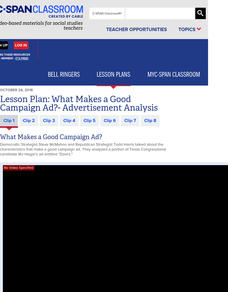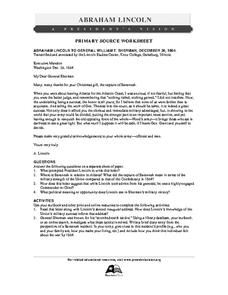Stanford University
Native Californians and the Portola Expedition
What was California like before the Spanish came? Class members discover the answer to the question using images of Native Americans and diaries of the early Spanish explorers. Scaffolded activities allow instructors to adapt the...
C-SPAN
What Makes a Good Campaign Ad?- Advertisement Analysis
In the time of a hotly contested presidential election, campaign ads are almost ubiquitous—but what makes them good? Using ads from the 2018 midterm elections, learners consider the various strategies candidates use to get the vote....
Echoes & Reflections
Antisemitism
Propaganda and anti-semitism were linked to evil ends during the Holocaust. Using video testimony of Holocaust survivors, examples of Nazi propaganda, and discussion questions, learners explore the roots of anti-semitism in Europe and...
Stanford University
Migrant Mother Photograph
A picture often has hidden stories to tell. Looking at the iconic Migrant Mother photography by Dorothy Lange, individuals examine the human toll of the Dust Bowl and the Great Depression at large. Other documents, including a statement...
Center for History Education
Women's Rights in the American Century
Today, many young people find it hard to understand why it took over 150 years for women in the United States to get the right to vote—why there was even a need for the suffrage movement. As they read a series of primary source...
Friends of Fort McHenry
Privateers in the War of 1812: Soldiers or Thieves?
Do governments have the right to authorize individuals to perform illegal acts during times of war? Did the US government really employ pirates? Use the War of 1812 as your vessel to answering these questions through class discussion and...
Curated OER
Social Studies Current Event Worksheet
Who, what, when, where, why, and how. This current events worksheet uses the traditional news article format and asks reviewers to record information included in a self-selected, current events article. Class members then use the...
Curated OER
"Uncle Sam's Got Himself in a Terrible Jam": Protest Music and the Vietnam War
"And it's one, two, three...what are we fighting for?" Use music to assess the climate of protest during the Vietnam War, listening to and analyzing Country Joe MacDonald's "I-Feel-Like-I'm-Fixin'-To-Die Rag" (lyrics included)....
US National Archives
WWII: Western Europe 1939-45 – Resistance and SOE
Germany seemed to be unstoppable in the early years of World War II, but the tireless and sacrificial work of the Special Operations Executive (SOE) helped to steer the war in another direction. After exploring primary source documents,...
Student Handouts
The Cold War: The Truman Doctrine of 1947
What was the Truman administration's position on foreign policy during the Cold War? Class members respond to an excerpt from President Harry S. Truman's "Truman Doctrine" with three questions in the space provided.
Ashbrook Center at Ashland University
Ratification of the Constitution
How difficult was it to get everyone to agree on the contents of the Constitution? Historians analyze the task of the Founding Fathers in creating the United States Constitution. They research a directory of video clips, primary sources,...
US National Archives
WWII: Western Europe 1939-45 – Deception and Bluff
World War II left the British desperate for help in any form—including in the form of a magician! High schooler conduct research on Jasper Maskelyne, a stage magician who used his talents to deceive the Germans on the war front, before...
Friends of Fort McHenry
Was the War of 1812 Our Second War of Independence?
Though it occurred almost 40 years later, could the United States have been fighting for their independence again in the War of 1812? Using appropriate primary source material from each of the two wars, compare and contrast the situation...
Humanities Texas
Primary Source Worksheet: Letter from George Washington to the Cabinet
Analyze the significance of George Washington's letter to his cabinet in which he sets forth a tradition of neutrality in wartime for the United States.
New York State Education Department
Global History and Geography Examination: August 2015
Need a comprehensive test about global history and geography? Look no further! Test young historians' understanding of how to use primary sources to formulate answers with an assessment that uses multiple-choice questions that require a...
Annenberg Foundation
Postwar Tension and Triumph
Go get the American Dream lifestyle! The 19th lesson in a 22-part series exploring American history shows learners the post-WWII economic boom. Using primary sources, photographs, and cartoons, groups discuss their findings and present...
National Endowment for the Humanities
The War in the North, 1775–1778
Using primary source documents, including maps, learners examine Revolutionary War events from 1775 to 1778. The focus here is on the challenges George Washington and the Continental army faced and how they persevered in spite of those...
Humanities Texas
Primary Source Worksheet: Abraham Lincoln, Letter to General William T. Sherman
A brief letter can speak volumes. Your young historians will analyze a letter written by Abraham Lincoln to General Sherman, and discover the significance of the capture of Savannah, as well as gain insight into Lincoln's role as...
New York State Education Department
US History and Government Examination: June 2017
Ready for a test that uses primary sources as a tool to assess comprehension? Learners answer multiple choice, essay, and short answer questions to demonstrate their understanding of American history.
NET Foundation for Television
1850-1874 African American Settlers
Go West, young man! Scholars investigate the impact of African American settlers moving to the Nebraska territory, following the passage of the Kansas-Nebraska Act in the mid 1800s. Using primary sources, timelines, maps, and...
Albert Shanker Institute
Economic Causes of the March on Washington
Money can't buy happiness, but it can put food on the table and pay the bills. The first of a five-lesson unit teaches pupils about the unemployment rate in 1963 and its relationship with the March on Washington. They learn how to create...
Curated OER
Recreation Yesterday and Today
Eleventh graders research entertainment and recreation in the early 20th century using the American Memory collections and From the Hidewood: Memories of a Dakota Neighborhood, a book by Robert Amerson reflecting life in Deuel County,...
San Antonio Independent School District
Breaking Down the Declaration of Independence
Are learners heavy sighing at the idea of reading a primary source, written in a language that is difficult to understand and in cursive? Look no further, because the resource breaks down the Declaration of Independence in an...
Humanities Texas
Primary Source Worksheet: Lyndon B. Johnson and Martin Luther King Jr., Excerpt of Telephone Conversation
Imagine listening in on a conversation between President Lyndon B. Johnson and Dr. Martin Luther King Jr., as Johnson outlines the support he needs from King to pass the legislation required for programs essential for "The Great...

























